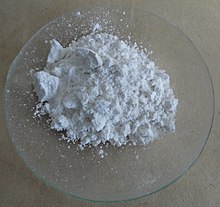Base anhydride
This article needs additional citations for verification. (October 2020) |

A base anhydride is an oxide of a chemical element from group 1 or 2 (the alkali metals and alkaline earth metals, respectively). They are obtained by removing water from the corresponding hydroxide base. If water is added to a base anhydride, a corresponding hydroxide salt can be [re]-formed.
Base anhydrides are not
Lewis acids, most notably acidic oxides.[1] They are potent alkalis and will produce alkali burns on skin, because their affinity for water (that is, their affinity for being slaked) makes them react with body water
.
Examples
- Quicklime (calcium oxide) is a base anhydride. It reacts with skin to become hydrated lime (calcium hydroxide), which is a strong base, chemically akin to lye.
- Sodium oxide reacts readily and irreversibly with water to give sodium hydroxide:
- Na2O + H2O → 2 NaOH
See also
References
- ISBN 978-0840049315
